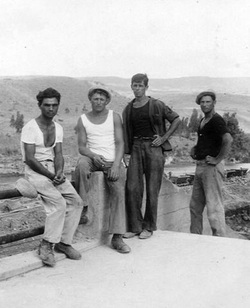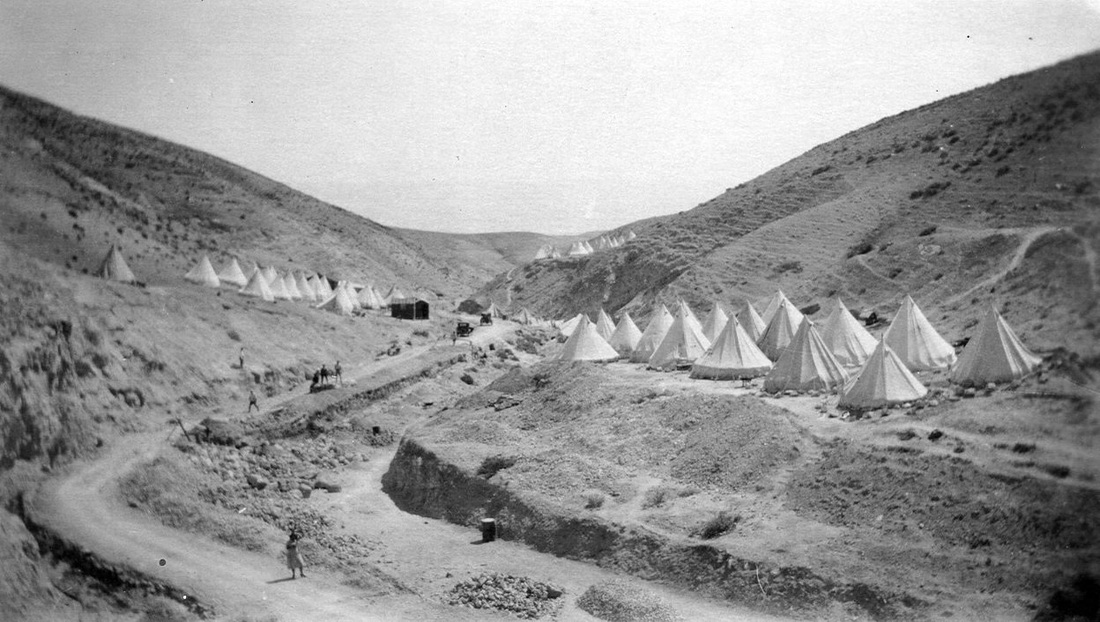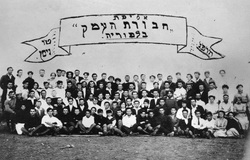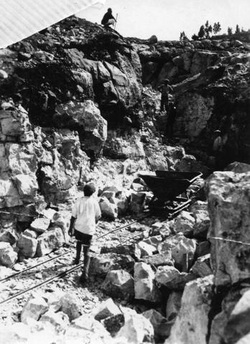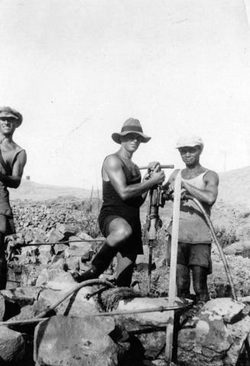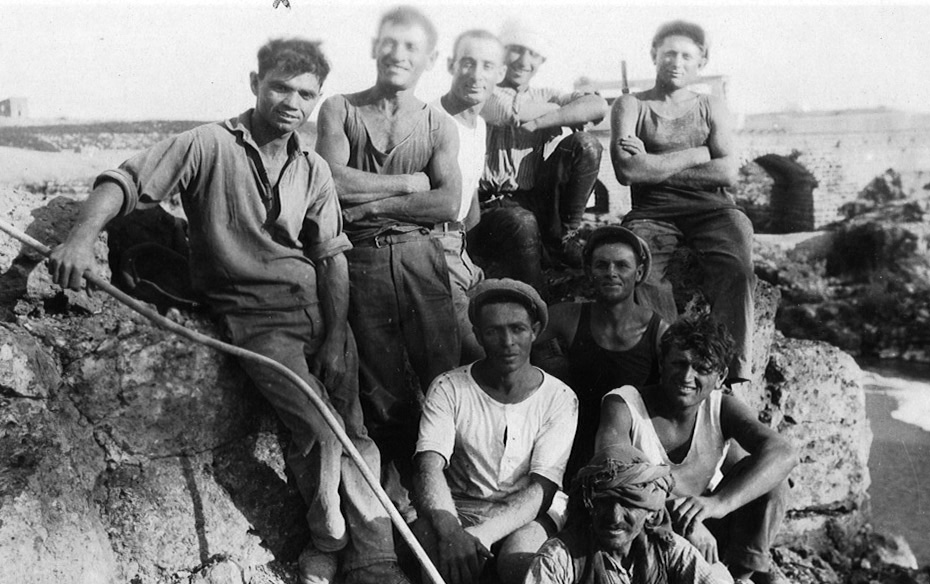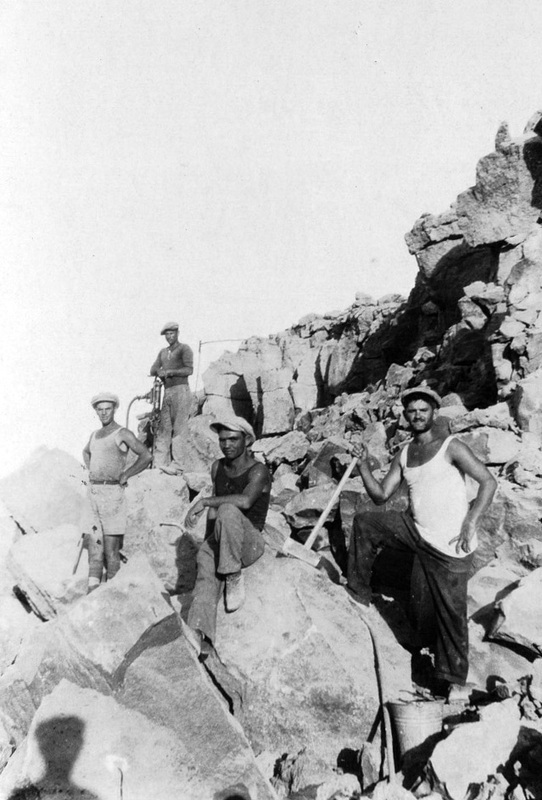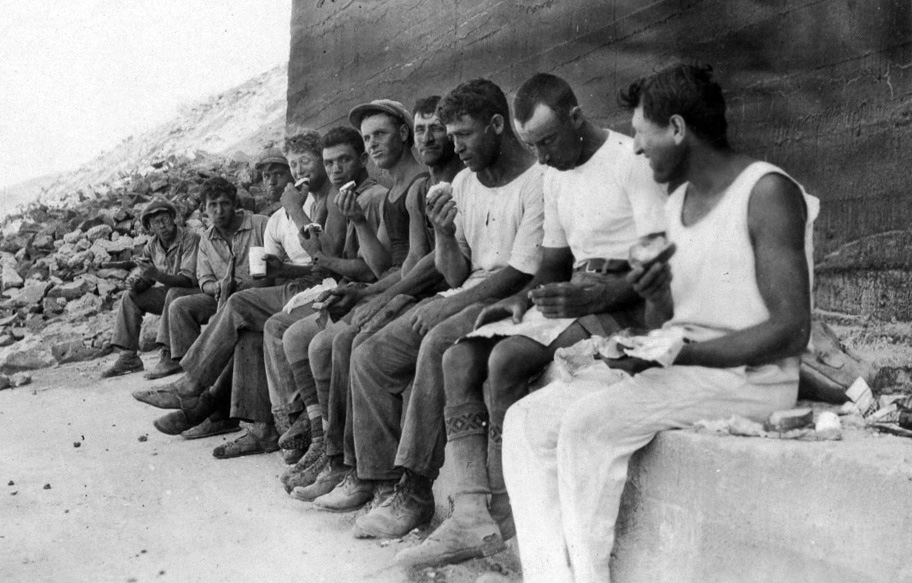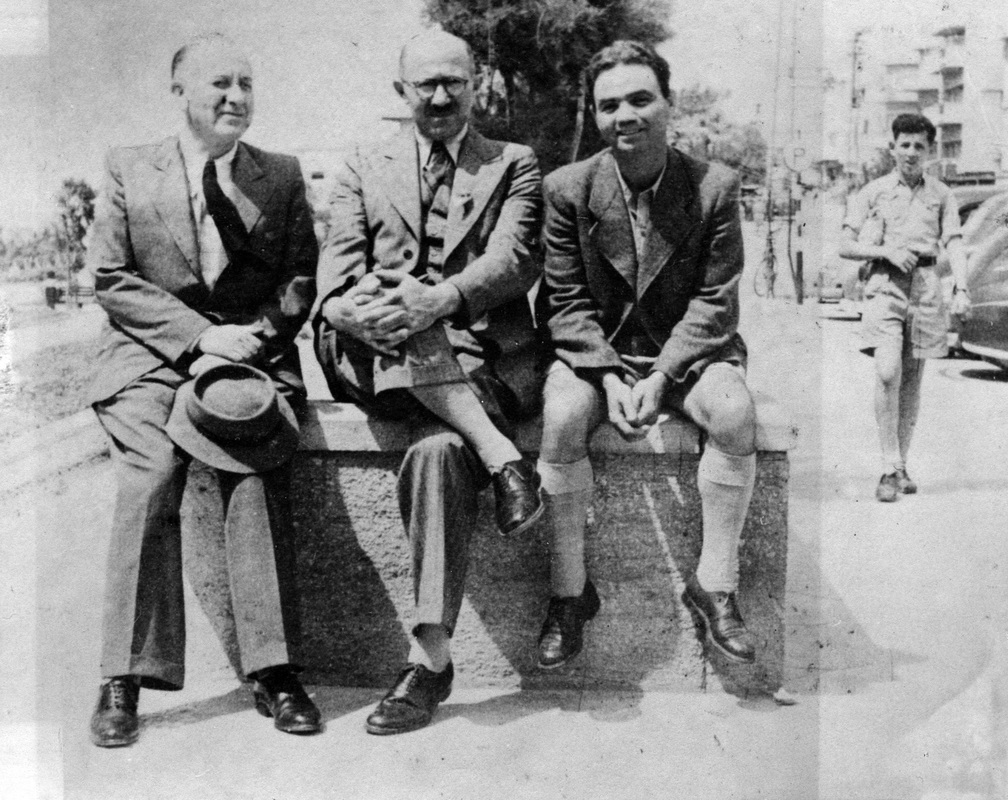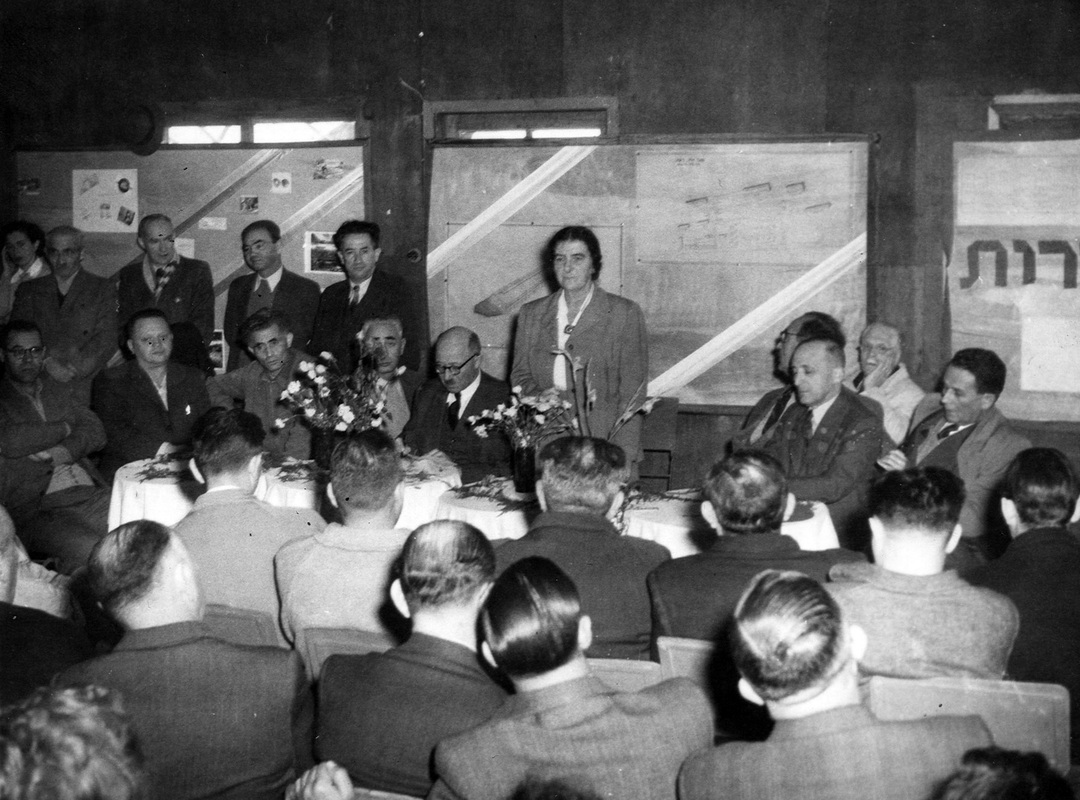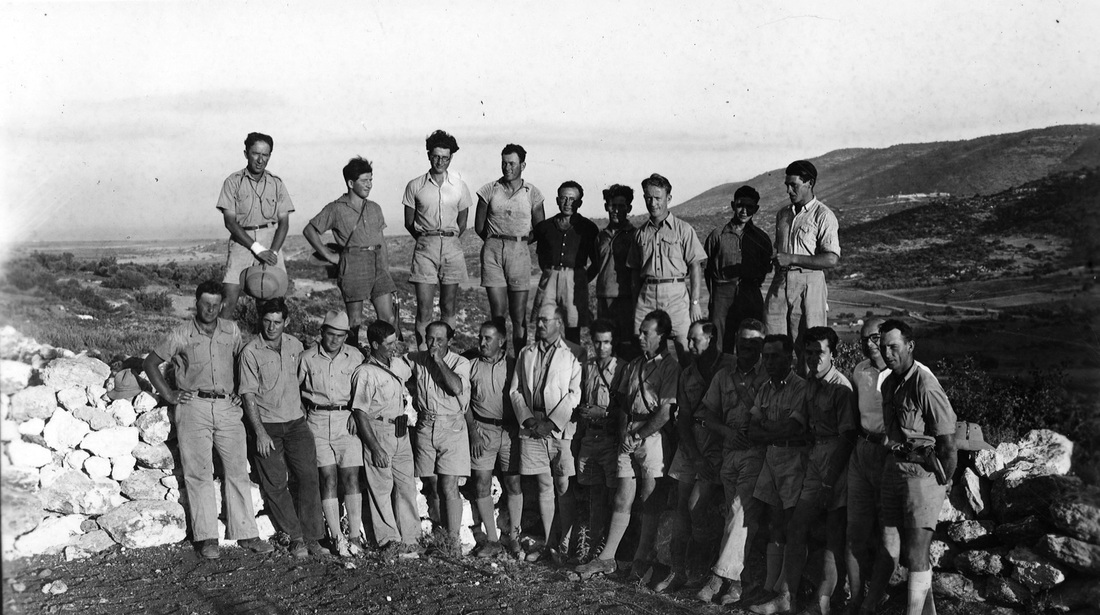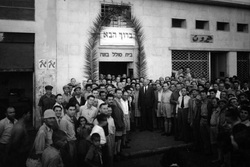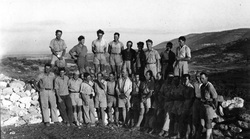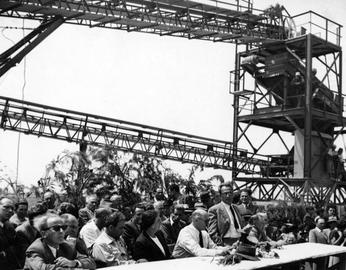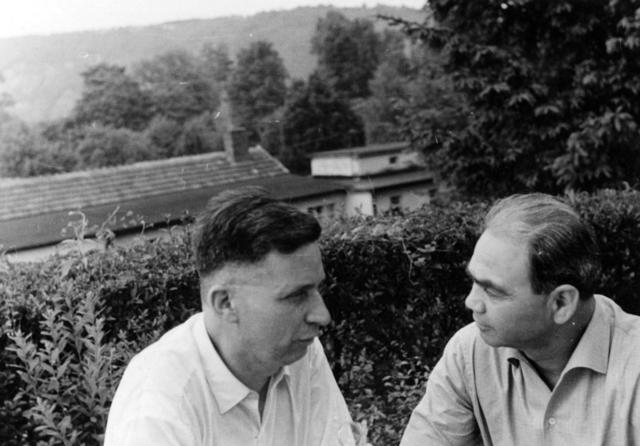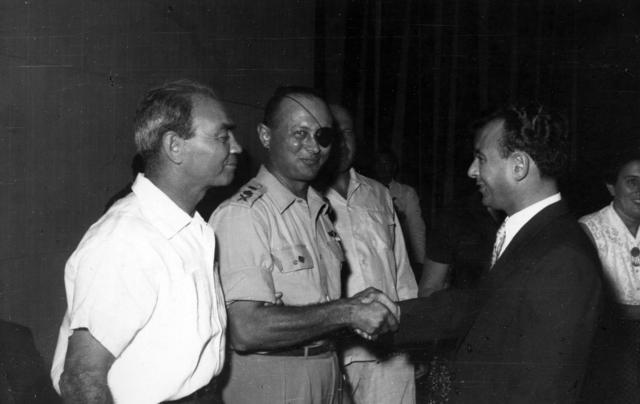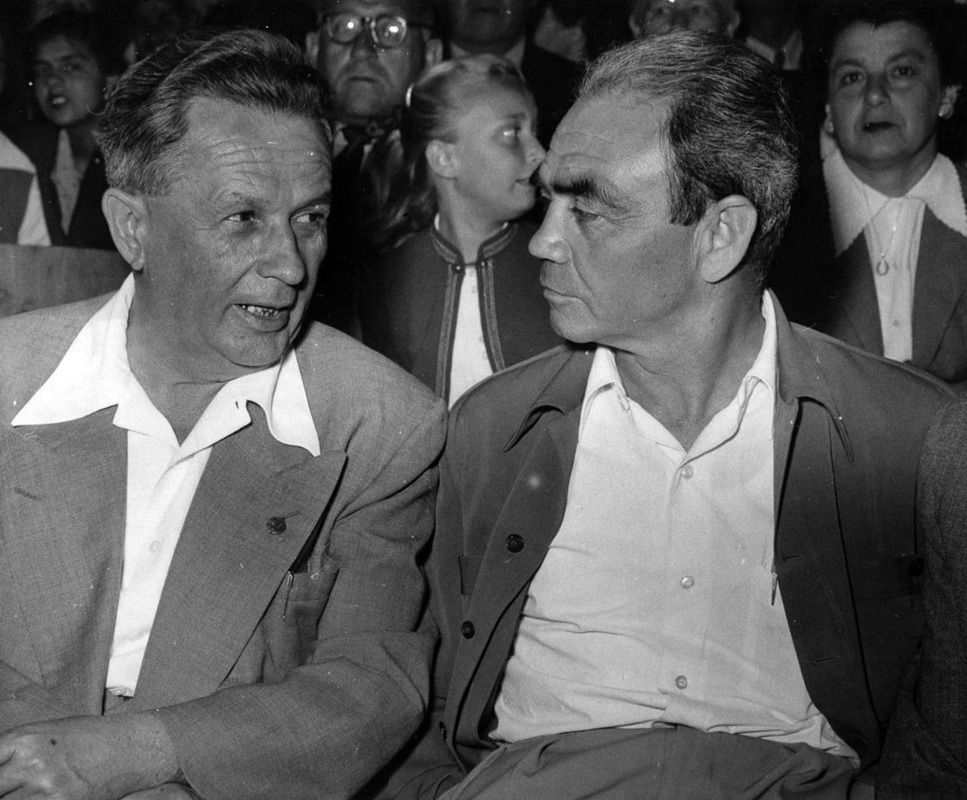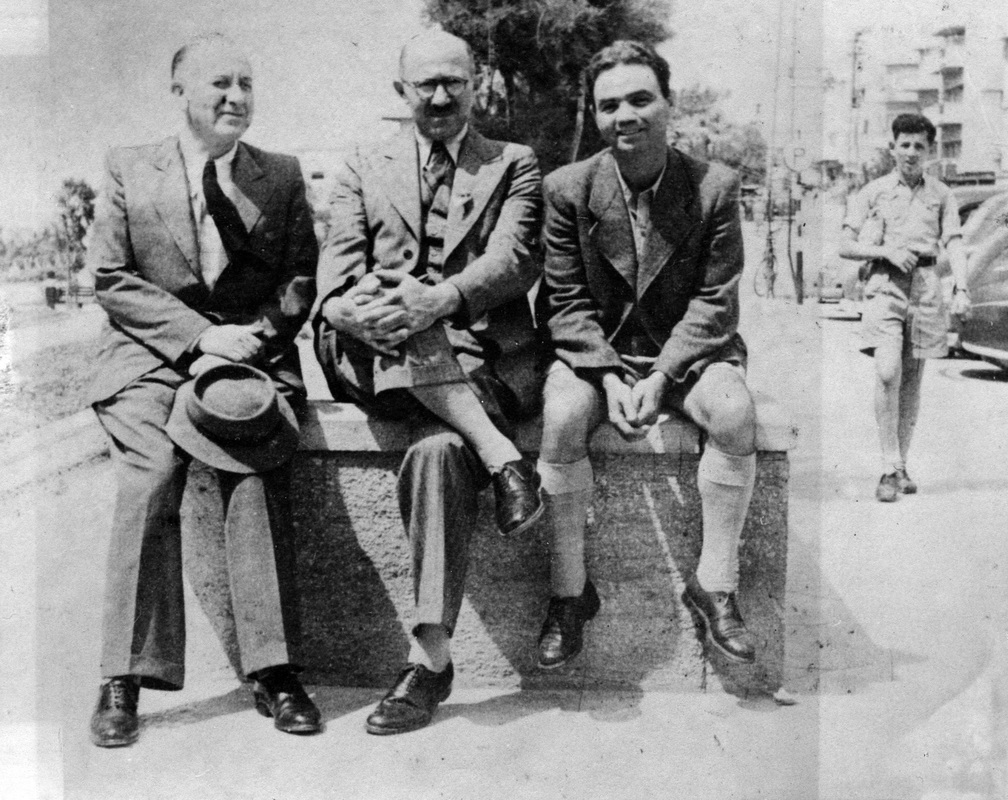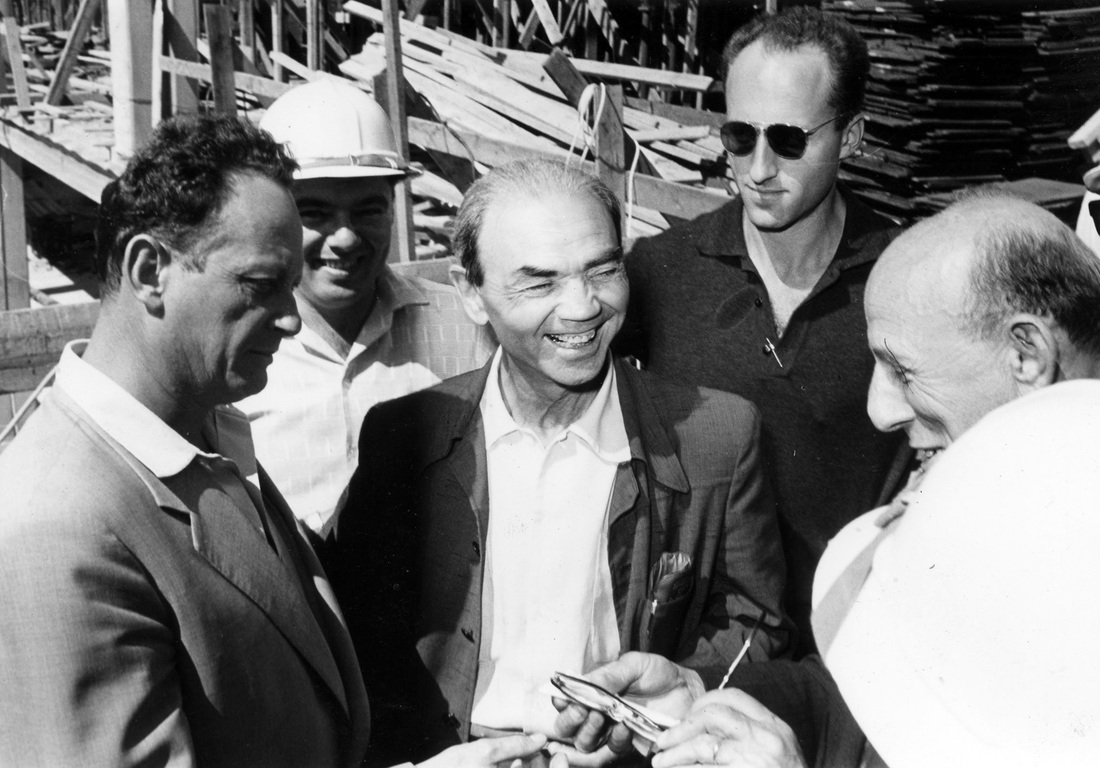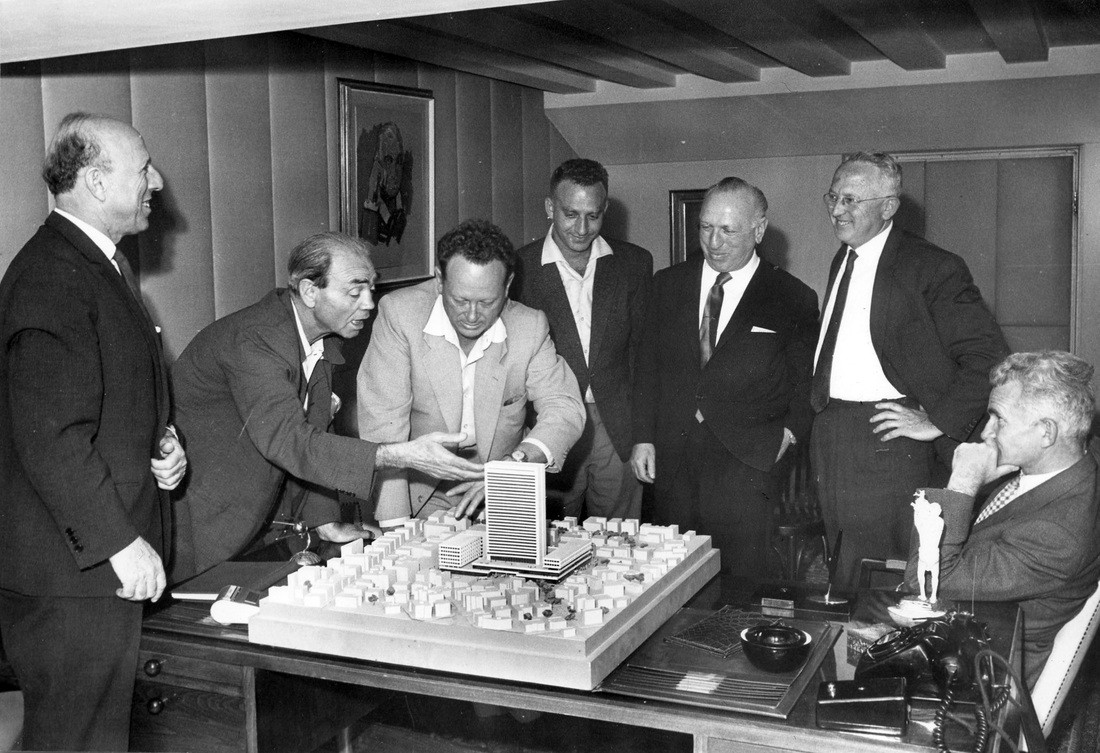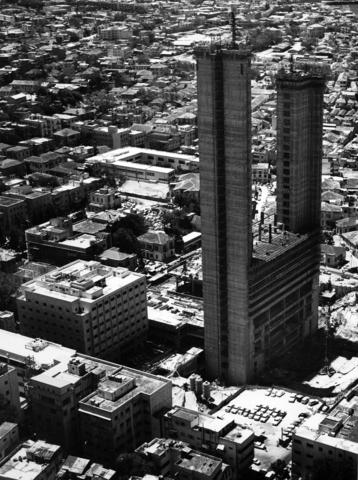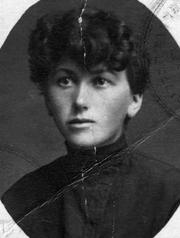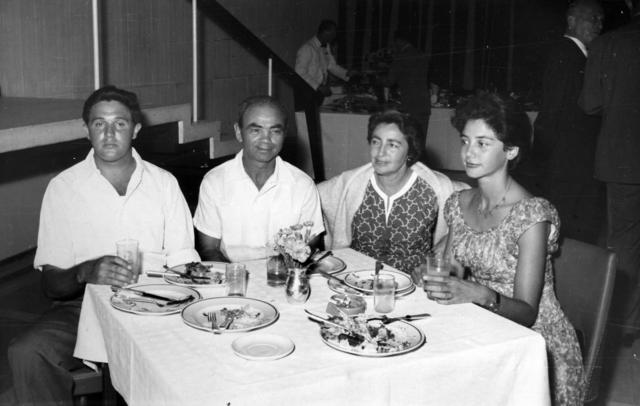Hillel (Zalman) Dan
Paver of The Way
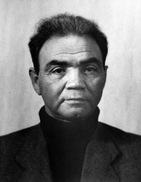
Hilel Dan
Hillel Dan's childhood was pleasantly spent in Aulkinyaki Vilna, a town surrounded by rivers and forests. Hillel was born around 1900, although he himself does not remember for sure the exact date. What is engraved in his memory was a shocking experience, when Lithuanian terrorists broke into the home. At home, at the time, were his grandparents, uncle, his wife and children. The intruders took a hammer and nailed the front door so no one can leave the house and set fire to the house with everyone in it. This image has played in his mind countless times since.
|
|
Although Hillel was sent to study at a Yeshiva at the age of 3 and was considered a genius, he himself went on to read secular books in Hebrew, which was then considered provocative, and caused the other children's parents to worry about the negative effect he might have on their children. Hillel did not feel threatened by that, on the contrary, he took an initiative and established a special class for children of different ages called the "Resurrection" which enabled them to have conversations in Hebrew. He managed to then raise funds and establish a school where Hebrew was taught. Later he also established a branch of the "Youth of Zion" movement which opened a real Hebrew library. When, out of the corner of his eye, he would notice the young people aged 16 17 sitting on street corners, smoking, being self-absorbed and acting as any normal teenagers anywhere would, he felt they were strangers to him. He later wrote: "They were strangers to me, because in me had already been blazing a different spirit" And instead of joining them he turned without hesitation to invest himself in community affairs.
At 1914 on the outbreak of World War I, Hillel knew what real hunger felt like for the first time. Yet, he often preferred the feeling of hunger over the stale bread that awaited him at home. "My discriminating palate could not bear its taste" he wrote. Distress, though, gave him new powers and at night he would load a big sack of corn on his back and walk twenty five miles to the city of Vilna, where he sold his corn in order to buy supplies to bring back to farmers in his town. Although he was afraid of being stopped by German soldiers he walked the same route three times a week. When the revolution broke out in Russia by 1917, Hillel began to organize to make Aliyah with his friends, but because he was asked by leaders in Vilnius to continue his Zionist activities in the city, he accepted their request and stayed longer. His final decision to immigrate was made after hearing people criticize him behind his back that he sends others to "make Aliyah" while he stayed behind. After an arduous journey Hillel arrived in Tel Aviv. The first night he spent in a tent on a sand hill near Gruzenberg St and the next morning he went to "hashomer Haztair" Work Assignment Office and was assigned to paving the Afula – Nazareth Road. While he waited five weeks to be sent to his new job, his brother sent him from New - York travel papers, work permit and immigration papers for the United States. Hillel returned the dear papers to him by mail with thanks and without explanation. Hillel's excitement was great. He was greatly influenced by the political atmosphere of the time, he went to the first Summit of the Histadrut and was listening attentively to the speeches that were made, and did not miss a single meeting. Finally he decided to join "Achdut Ha'avoda" Party in which he remained. Hillel believed in "Achdut Ha'avoda's platform and became convinced that had its substrate (mainly the cancellation of having separate parties) been adopted then one cohesive social block would have been formed, and the values that were so important to him would have prevailed. The fact that the coalition in the Histadrut had never come apart, as opposed to governments and political parties that did fall apart all around, was proof enough for him that he was right. Hillel thought that all Labor parties should be working as one organic unit, both, ideologically and socially, "wherein", he wrote, "lays their strength". Hillel regretted the arguments, and saw them as inflicting great damage, especially on the young members and new immigrants who were active in these frameworks. From his experience and involvement with employees, he knew many people were bothered by factionalism and intrigue in the camp of the workers, and was sorry to see means wasted, means which otherwise could be used to expand and develop the country. He blamed mainly the professional organizations and community leaders. "Factionalism", wrote Hillel, "caused suppression of self-criticism (A phenomenon which has become characteristic of workers' parties in the country) and stopped lively and independent thought." When he came and saw the meeting hall of the Histadrut he wrote: "no fresh breeze penetrated inside the place and the heavy curtains seemed like pale tin boards - . The atmosphere was like of a museum- stony and barren ...... unfortunately people did not add anything to the seventh floor hall that was not there when it stood empty. " And yet, still, despite all this, Hillel Dan saw the Histadrut as "a cornerstone for the people in their country." 1921-1927 On January 1921, the two parties' Work agencies "Achdut Ha'avoda" and "Hashomer Hatzair " merged and became: " Ministry of Public Works and Construction " office. It was an organization, over-seeing the contractor groups of workers; Hillel was elected Member in the committee for "Equalizing Rates". The committee's role was to make sure that no group will be discriminated against in terms of number of employees hired and the scope of work it gets in relation to other groups. The group mattered more than the individual, since the general view then was idealistic, the goal was fulfilled through the collective life. In May "Chavurat Haemek" was formed. During late hours after work, Hillel engaged in its management. He was not as popular amongst members of the group as he used to scold people who seemed to lax in their duties. This group differed from other groups because it claimed that Zionism is the means and a step on the road to socialism. National vision came first and the realization of socialism was the means. Occasionally Hillel would go and see immigrants in Haifa and Tel - Aviv in order to convince them to join the kibbutz. He remained a member of this core group from the first day until the foundation of Kibbutz Emek Ein Harod which was established by them. Hillel demanded the group to remain a public body which will continue to expand and not to give in to those seeking private contractors. Also, any capital, that was not required for basic expenses, shall be re-invested for needs of development. This request of his was accepted and eventually turned this group into the contracting body of the Histadrut:- "Solel Boneh". "I saw your work, and I am convinced that the future of our race lies in your hands" – upon hearing these words by Albert Einstein during his visit to Israel in 1923, Hillel wrote: "the blood rushed through my veins," Secretary General of the Histadrut then, was David Ben Gurion, and the General Assembly held that year was extremely important. We were "Shaping concepts" writes Hillel, "Setting principles and our views were formed." The Histadrut had become a powerful force. "Havurat haovdim" led to the establishment of "Solel Boneh" - "A Cooperative Company of Public workers, building and factories, Ltd.",as it was defined by Hillel. The personalities behind decisions making at that meeting were all great men whose spirit was felt everywhere: David Ben Gurion, Berl Katznelson and David Remez. These people possessed long-term vision, and helped write the regulations of Solel Boneh. "It is astonishing," wrote Hillel Dan, "how far- reaching was the perspective of these drafters of the regulations . If we were today to re-establish " Solel Boneh" , we could just copy and paste this draft , without adding nothing to it ". How to convince a skilled worker to earn less? These persuasions of Hillel, almost cost him his life. The "Great preacher" they mockingly called him. The greatest difficulty was the need to price a job at rates lower than those of the private sector. Rates, the company could not really afford and therefore always incurred losses. This company had not been a priority among the Zionist institutions then such as the Jewish National Fund. The bank stopped giving credit and foreclosure orders were coming in every day, and so the understanding emerged, that the company must ensure equity and ensure the free flow of cash. "Solel Boneh" was created to fulfill this goal. Upon its establishment "Solel Boneh" wanted a fresh start, but the remaining debts from its previous office were lingering, and so no one saw any profit. "Solel Boneh" therefore, decided to issue shares to sell to private individuals in Israel and abroad, for investment purposes. But the capital did not flow, only trickled and those shareholders did not see any profit. However, due to the intensification of the urban construction in Tel - Aviv, it was possible to trade in the capital market and begin production of construction materials as well as fund training for independent professionals in order to raise the level of the Jewish builder who lagged behind his Arab counterpart in terms of manual labor. Narrowing the gap among the Jewish builder and the Arab builder occurred also due to a mechanical revolution "which was one of the more important achievements of "Solel Boneh". In fact this revolution was not only mechanical but included use of materials like cement, gravel, iron, gravel and water and thus created the first concrete in Israel. "We had to learn the appropriate lesson" wrote Hillel, "The strength of the Jewish worker is not in manual labor as such, but, he has other features that allow him to compensate and learn complex mechanical processes." Hillel had dreamed of establishing an industrial firm, capable of providing for itself all of its needs, from basic materials to accessories, but he saw no chance of the English rulers of the land favoring the Jewish attempt to establish an industry. They regarded Palestine as a market for their own industry trend and would not encourage the establishment of a local industry. These government policy problems were solved only 15 years later when Britain needed industrial production during the next war. Despite problems in cash and inexperience, they could establish what Hillel called: "Seeds for an industry that did not stop dreaming." And sure enough, in the mid twenties, a stone industry emerged, also the wood industry, and other cement products. Meanwhile, Hillel continued to evolve ideologically. He began to identify less and less with the Marxist writings as he recoiled from "isms". Later he wrote on what he simply did not agree with: "On the one hand the 'pure" proletariat and on the other side the hypocritical bourgeoisie- the first are angels and the others the worst…" Hillel, then aged 26, disliked extremes and continued to say: "Later I learned that nature, in its playfulness, does not tend to consider a person's social origin and has created both good and bad here and there." Hillel's world view was shared by those who literally fulfilled the Zionist dream in their bodies, as oppose to those who preached fulfillment from their home in London. And so, when an Englishman, was appointed as the Attorney Chair of the Executive office in Israel, Hillel was upset, thinking that he and his friends were perceived through the eyes of the new chairman as:" non-hirable" and as "people without experience. " During this difficult period (1925 - end of World War I) of high unemployment and speculation in the land, rather than initiating projects, the chairman decided to grant pensions and build kitchens for the hungry. To Hillel these were soup kitchens and charity. It seemed as though the Zionist movement was taken over by hostile forces. 1927-1929 In 1927 the Yishuv had experienced the biggest economic crisis since the beginning of the settlement in Israel. "Solel Boneh" continued to work at a loss which led to its collapse. The Inherited deficit present at its inception grew because of the high interest rates, which Hillel saw as being one of the gravest misfortunes, and so he then approached the Zionist Executive Board and demanded that all previous debts of "Solel Boneh" will be waved. In addition, he demanded from the Histadrut, to set a unified scale of wages for private contractors so they can be monitored. Hillel was convinced that "Solel Boneh" did not go bankrupt, as proof, he detailed the amount of work the company had done, and the values it had created, which balanced out the loss in money. With no fear of taking risks, he realized that the only way to recovery is to continue the work, and so he formed an agreement. He was given a loan, but that also meant someone was appointed on the Board "on behalf" of the Lenders. The representative had the power of Veto and Hillel says: "He used it as a stick". Hillel watched the 3rd Conference of the Histadrut in 1927 and realized that the economic crisis and unemployment rate led heated public debates about the continuing efforts of "Solel Boneh" and increased the number of "timid" voices, as he called them, and these, in fact, led to the end of the road for "Solel Boneh". Hillel loved David Remez's reaction to all of this. He saw in him a man who is "a wonderful fusion of Mysticism". Yet, thought Hillel , that this combination of properties of an intellectual on one hand and a material man on the other, made Remez compromise in both. Hillel was fighting for his views and tried to preserve at least the "Amos" quarry in Jerusalem, until he met with Ben Gurion, who he always saw as his mentor. He described it this way: "I accepted their decision. Ben-Gurion for me was the final arbiter. Now, I know that decision was wrong." As far as Hillel was concerned, the Zionist Executive Board abandoned the quarry. Hillel himself has seen the collapse of "Solel Boneh" as the end of the material reservoir only, and was convinced that the vast reservoir of knowledge acquired by many thousands who worked, was not dissipated – quite the opposite, the power of the workers will be strengthened from the experience gained. Hillel wrote: "an act which has created our body's immune system antibodies." Sure enough, eight years later, when "Solel Boneh" was re-established - it was a stronger company which could rely on itself solely. The general situation has affected social life within the kibbutzim. Though they were bringing many new members from the city to the Kibbutz, it seemed there was not enough focus on the social content within the community collective. The demand for social life in all of its fury appeared in a dramatic fashion, and the collective thought was that political activity might be able to fill the void that was created in the social sphere. Hillel, upon hearing such talk that the group should be more connected ideologically to socialism and to constructive communism* did something that was not like him. He asked for permission to speak and said: "You must not adapt a political ideology as this may encourage a tendency to isolationism of the group. This may get in the way of trying to offer the Kibbutz as a way of life that is an option for all." - For some reason these words were omitted from the record of this meeting. In addition, Hillel also had a difficult personal time following the death of his eldest daughter, Rama, at the age of seven months. Therefore, in order to change the atmosphere he went to live in Rehovot. After a while, he returned to Jerusalem to manage a large forestry project. Unfortunately, again there were losses due to the demands for high wages by the Communist Party which represented the workers and the result was bankruptcy again. On January 1921, the two parties' work agencies "Achdut Haavoda" and "Hashomer Hatzair" merged into one office called: "Ministry of Public Works and Construction ". It was a contractor organization – over-seeing groups of workers, and Hillel was elected Member of the "Equalizing wages" committee. The committee's role was to make sure that no group will fall short in terms of employees hired or in the amount of work received from other groups. As the view on life was idealistic then - the goal was to be fulfilled through collective life. Thus, the group "Chavurat Haemek" was founded in May. Hillel was involved in the administration, worked late hours, after work, yet, he was not so popular among the members, as he used to be the one to point out if people were lagging behind. This group differed from others because it claimed that Zionism is a means and step on the road to socialism. National vision came first but the tool in its realization was socialism. Occasionally he would go to immigrants in Haifa and Tel -Aviv in order to convince new immigrants to join the kibbutz. He was a member of the Executive Board, from the first day until the foundation of Kibbutz Ein Harod which they established. Hillel also demanded that the worker's union would not give into those seeking a private contractor; rather, it should continue to serve as a public body and continue to expand as such. And that any capital that is not required for survival should be put aside and be invested back in the company. His demands were approved and in time this group became "Solel Boneh'. To Naharayim and to his meeting with Pinhas Rotenberg (who left a deep mark on him), Hillel came as a paver and as a manager for the party. Only 28 years old and already had his share of disappointments in what he saw as failures. He was disappointed mainly that they could not interest the urban communities in the Kibbutz as a way of life for all. Immediately upon arrival to Naharayim he found himself in the thick of a passionate political rally, and upon hearing the workers, who one by one, stepped up to the podium to complain about their working conditions, low wages, etc., Hillel asked to speak, and exclaimed that Naharaim has the best conditions in the country, and that no-one should delude themselves that someone else would give them something better elsewhere. Party members were very angry hearing his words, for it was the eve of elections, and plenty of promises were made and they accused him of sabotaging the elections, but when they got the results, it turned out that not only was there no sabotage, instead , his party, "Achdut Haavoda ", won 70% of the votes. Hillel wrote:" This was a valuable lesson. The truth is worthwhile politically too, even if it is not always popular." Hillel did not want to get paid in the same way as the other officials, rather, he insisted on working as a laborer right along the other workers paving the roads. The worker's affairs required full attention, but Hillel felt that people don't respect those who politicking became their main profession. Physical work was for him the supreme value; Due to the intense heat and mosquitoes, the work was done early in the morning and late afternoon, and the rest of his time he spent in public affairs, unlike other group members, he remained awake late into the night. The hours he had to miss work in quarrying, were paid out of the council's budget. Meanwhile, closeness has formed between Hillel & Pinhas Rotenberg and he was brought into closed meetings with Ben Gurion and Berl Katznelson. These meetings would start with dinner and end with a debate that lasted into the wee hours of the night. Rothenberg often expressed a trenchant critique of what he saw as the "Histadrut's idle debates" while he (Rotenberg)" was electrifying the whole country with his ten fingers "Mainly he expressed his fury with Dr. Weitzman saying: "No country is built in diplomatic negotiations and ways of lobbying." Rotenberg emphasized that any inter-dependence will make the process of decision making in the future that much harder. The work in Naharaim aimed to provide electricity on a national level and despite initial resistance to Jewish electricity it was not too long before Arab neighborhoods approved of using this electricity through the Arab majority in the city council in Jaffa and Haifa. Rotenberg founded the Electric Station, another power station in Tiberius and also begun to make use of the waters of the Jordan and Yarmouk rivers for electricity generation. Some of the work was done by controlled explosions which only a few knew to operate. One day a worker asked permission to start the spark (for an explosion). Hillel knew that this worker did not have enough experience in using the new instrumentation but still approved the request and the man pressed the lever too fast. Hillel fell on his face as waves of dust and stones rained down on him from on high. He touched his limbs and found them intact but he was bleeding profusely. Hillel bruised his head and arms. The next day his parents were due to arrive at the port of Haifa, and so, bandaged from head to toe, his bottom jaw pulled sideways, Hillel drove to greet them on the platform. 1929-1933 Naharaim's construction work did not cease for a moment, in spite of the bloody riots which broke out on September 27, 1929. Some workers worried and wanted to stay close to their families. Hillel himself was torn. Six months earlier, his wife gave birth to twin girls, Tova and Illa. The family lived on a narrow street in Haifa. This street linked the center of the Arab rioters with Hadar HaCaramel and the distance to the Arab position was only a few meters from the house. Nevertheless, Hillel did not abandon Naharaim. And eventually the riots passed them over. Hillel worked in Naharaim almost three years. It was a formative period for him. He greatly appreciated the fact that Pinhas Rotenberg was a practical Zionist. He believed that Herzl's vision can be realized in practice only if it is reflected in the adoption of the emphasis on external mannerisms - something Rothenberg knew was of the essence as far as the British were concerned, and therefore tried to act accordingly in a dignified, modest and a serious way. In 1931 it seems that Hillel had learnt to "play" the bureaucratic game. He did not want to abandon his fellow workers from Naharaim, when he moved to Atlit, and he knew that the pay which was offered in Atlit was lower than the wages workers had received in Naharaim, so he established a fund that helped compare the wages in Atlit to what the workers got in Naharaim. That brought Hillel in front of the Audit Committee of the Histadrut in order to explain, since the word got out that his workers are hired in Atlit "out of turn". Hillel warned the committee against the Hitadrut being rigid - to him, the important thing was to ensure employment for the Jewish worker. Although he was reprimanded by the committee he was glad he spoke his mind. When Hillel and his friends managed to get from the English a higher rate than the one they had expected, Hillel decided not to reveal it to anyone and to keep the difference between the price received from the English and what they paid the workers, and save it to the company's equity. Hillel emphasized, that the wages that were paid to the workers were very fair for the market conditions at that time. At the end of 1931 he moved to Haifa to be near his family and began working as a laborer at the IEC network Haifa. Soon he began to feel the lack of joy in his work. He remembered how, when he saw other pioneers, devoted as he was, become empty of faith and abandon the path, he would feel their pain, he always wanted to be stronger than that. One day, while working, an exposed cable slipped from his hand, and when he touched the bare wires, an electric circuit was created around him and he had a sort of a "near death experience". Hillel describes it this way: "Great peace filled my being, familiar faces moved in front of my eyes as on a conveyor: Father, mother, brother. The balance looked pretty bad to me, since so many ideas I wanted to actualize, and so little did I actualize over the 31 years of my life ...." Hillel did not return to work at the network for six months. The winter floods in 1933 came to his rescue, when the Yarmouk River flooded, Hillel was called to Naarayim to help repair the dams. After six months, when they finished the project, Pinchas Rotenberg offered him to join the permanent staff of the IEC as a plant manager –promising that in time, he will be moved to the center so he can grow with the plant. He declined the offer. David Remez, invited him to Tel - Aviv and offered him to be a member of the Workers Council in Tel - Aviv and to coordinate the construction committee-he declined also. Hillel did not want a role in the organization due to fear of losing himself and the special character of his personality which defined who he was. He was not ready to give up the vision of a large contractor's plant factory that would have influence all around. Hillel needed a greater freedom of initiative and creation, than the bureaucratic framework would allow for him. So when he was offered by Remez to join the "Minhelet Haavodot" in Haifa, Hillel was delighted with this proposal. He knew it was the right place for him and that if the rebuilding of the "Solel Boneh" should come to pass, this would be the place where such an initiative can develop. 1933-1935 During the mid-1933's Hillel became a full-time manager. His income increased accordingly. During this period the Jewish German immigration made Aliyah and had brought with it a considerable fortune. Yet, it had also created a situation of a shortage of experienced construction workers (as most of the German Jews had an academic background). In addition, it was still forbidden for "Solel Boneh to work inside the three major cities, because the exclusive right which was reserved only to the Contractor's office "of the Council of the local workers". Hillel's long term vision helped him here again. "The Need to combine all the urban offices was our first priority, though at the same we did not talk much about it out loud. The only way to achieve this was to create facts." Hillel emphasized that uniting all the centers was a powerful lever for advancement. During early 1934 the negotiations over the construction of Pinchas Rotenberg's power station in Haifa created a great outcry among the contracting offices saying that the management of the employees violates the agreement and penetrates areas of the city of Haifa. Hillel, in a pre-calculated strategy, worked with the secretary of the local council, Abba Hushi. Abba Hushi was working at the time with Solel Boneh in Jerusalem, and Hillel was counting on the emotional bond he had with the company. Hillel liked Abba Hushi who in his opinion "had a sharp vision." He calmed the fears of Hushi and promised to continue funding the expenses of his office and thus guaranteed his support. Thanks to the connections created between Hillel and Rotenberg –"Solel Boneh" was approved for "management jobs" and could get credit on account of incomplete work. Expanding the business scope has allowed competition with private contractors, Jews and Arabs, and thus Raanana - Kfar Saba and Ra'anana – Herzliya roads were paved. Building the Jerusalem's water plant was a huge job (four pump stations, buildings, railway machinery, building homes for employees and internal road construction). And although the office was not registered as a company and had no legal status, David Cohen and Shmuel Margolin convinced General Wauchope to give them the job.At the same time, large mechanical equipment was bought. And "Even Vesid" company was established in a partnership with a wealthy Muslim from Haifa named Kramen, a partnership which lasted until the War of Independence broke out. It so happened that the Contractor Office in Haifa feared to be responsible for the construction of Kiryat Haim and even though people from the "Management Work" office were not clear whether they would profit from it –they still committed to the job. During the five years- since the elimination of "Solel Boneh" till 1933, the management has gained a total profit of £ 9000 and three years later the amount came to 120 thousand pounds (In 1935, a pound was worth as much as 50 pounds in 1963). 1935-1938 In February 1935, on the agenda was the need to replace the "Management Work" office with "Solel Boneh", Ltd. David Remez specifically disapproved, to the surprise of Hillel and for many years Hillel tried to understand Remez's position on this issue. What Hillel realized is that he was very busy and was not paying attention, and that Remez saw that the Histadrut."Was touched by professional activism and it began to take hold of it - here and there - and the Executive Committee already blew blight winds. Real pioneers had to fight to not be pushed aside by pragmatic public representatives who wanted to climb up the hierarchy" wrote Hillel. But, and despite all the reservations, it was Remez who finally persuaded the council to approve the re-establishment of "Solel Boneh', as a stock company which belonged to all members of the Israeli public through "Hevrat Haovdim". Known economic theories are better suited to normal conditions of a nation that is sitting firmly on its land for generations, but if you try to apply an economic theory without examining the specific national, social, political conditions and the unique demographics of the place - it gets an absurd meaning. For example, Israel could establish a healthy national economy based the construction industry although it is considered not productive and seemingly cannot return the invested capital and profits. Hillel understood that it is not enough to have decent working conditions, since private contractors can always offer more pay and therefore, it was important to stress Solel Boneh's vision. Hillel began to gather factory contractors – pioneers, who have found in Solel Boneh, a way to fulfill their goals. They had abandoned farming and came to Solel Boneh without feeling that the creative momentum at the contractor's plant fell short from the momentum of settling the country. Hillel insisted on keeping personal and professional relationships clean. "We, the five board members did not need to make any effort to demonstrate what is called today 'setting an example' it was our way of life." On May 29, 1935, "Solel Boneh" issued ten thousand shares -9988 went to company employees, free of charge and this formed the capital base. The capital available to them before (120 thousand pounds) was enough to give full coverage for these stocks, 12 stocks were given to the leaders and the members of the first administration of Solel Boneh, including Hillel and of course he felt it was a great honor. Hillel organized the affairs of the main office in Haifa. And conducted meetings when David Remez was absent, he was responsible for the agenda of the meetings that were held every Sunday before noon. Hillel notes with satisfaction that meetings often had arguments, screaming, tantrums, but eventually there had always been unanimous agreement, nor were any hard feelings. All of the Executive members were responsible for all decisions taken. The work continued picking up momentum and hundreds of residential units in Kiryat Haim were completed. But when Hillel came to get a home in those very same projects he helped build, council members have been slow to put him on the list of those entitled for housing and suggested that the reason is the political views of his wife who was close to the Communist Party. Hillel believed the real reason was his independent views - either way - they could not keep him from settling in Kiryat Haim, and that's where he lived. All the while, the work continued, and Solel Boneh continued to build Kiryat Haim until 1940. As well as establishing the shore power station in Haifa and many other jobs in the north. Jews in Tiberius deposited with Solel Boneh the lot of their construction work such as a protective wall on the Sea of Galilee, Tiberius, Herzliya, Hotel in Tzfat, a movie theater on Mount Cana'an, buildings on the south bank of the Kinneret. "Solel Boneh" extended the Raanana - Kfar Saba road as well as Ra'anana- Herzliya road and the highway road linking Haifa - Acre with the factory "Silikat". The pace of the activity was intense and the turnover reached tens of thousands of pounds per month. Of course the administrative apparatus grew, and so a large office building was built and entered into in 1935 and the technical department was established as well with its first director Dov Iz'nsky. "The condition for success was joining forces" wrote Hillel. Since the reunion there were still restrictions and prohibitions on Solel Boneh on building within the three major cities, and Hillel wished to consolidate all the offices and remove these limitations and was able to do so with the help of Abba Hushi and so managed to make "Solel Boneh" the largest contracting company in the country and the entire Near East. As long as the work continued at the ports of Haifa and Acre there was no need for another "Jewish" port. With the arrival of Jews during the Fifth Aliyah, and the public and private capital that flowed from the immigrants, and the fact that the Arabs, who feared Jewish porters, made attempts to fight them, quickened the process of establishing a Jewish port. Acts of violence against Jews in Jaffa and the threat to those who worked at the port area gave the community the reason of why they need to establish their claim to the side port. The British Mandatory government tried to ignore the request but eventually responded positively to the request and issued a license to unload goods in Tel Aviv. Building of the port was the highlight of Solel Boneh's achievements between the years 1936 to 1939. In reality, the port's usefulness was less than what was anticipated. Ten years later, though, the port justified the promise. It became a central base for organizing the army away from the British eye. When the period of "Homa & Migdal" came, as many as seven settlements emerged in one day sometimes –and "Solel Boneh" came to the rescue effort, linked the settlements, and built an intricate network of security roads instead of the usual roads keyed in by the Arabs. And despite of all these complications, in the organization fund remained the net profit of sixty thousand pounds. Hillel was engrossed in work and did not pay much attention to outer appearances but when he met an English engineer named Brown, the later refused to shake his hand saying "I hate people who come to me dressed like that" Hillel left the room feeling humiliated. Pinhas Rotenberg later managed to make him forget the offense and bring him back to other meetings. Hillel returned, wearing a suit and tie and felt "as one being led to be hanged." Rothenberg's smile over the shoulder of the engineer Brown gave him back his confidence. 1938-1952 In the same year (1938) after the contractor's office near Jerusalem amounted almost to bankruptcy; it merged with Solel Boneh, which took responsibility for its debts. David Remez came to their aid and Solel Boneh was freed up from the limitations imposed on it and was able to build the country. The contractor's office in Tel Aviv remained active. All the mergers increased the company's fortune, and as before, all shares were deposited with the company employees, except the twelve shares that remained with the board members and heads of the Histadrut. When Hillel noticed that the director of the stone industry hesitated to expand, he decided to take his own initiative. The Arab partner, Kerman, fled to Lebanon with the outbreak of the riots of 1936, because he feared the Mufti (the Arab religious leader) but the partnership itself was not dismantled and its shares have been deposited with the Benjamin Group. Hillel wanted to increase Solel Boneh's share at the stone company, and acquired a U.S. company that was deep in debt, and thus the share of the partner Kramen decreased from 25% to 7%. Soon the stone industry was taken by the subsidiary of Solel Boneh and has become the main supplier of the government. Hillel went on with his investments. He purchased the cooperative while ensuring full rights to the members of the cooperative and to the "Bonnie Haifa" company. The Kibbutz settlements caused "Solel Boneh" some difficulties, since they thought that the money that was paid to Solel Boneh for its work in the Kibbutzim should have remained with them. Hillel rejected that claim. He then purchased - "Phoenicia" (glass) factory , "Vulcan" (metal industries) factory , "Eagle" cement factory, gave his energy to the founding of the national shipping company" ZIM "(1945), was a member on the Board of Directors of "Zim" all the while, he was also top management of "Solel Boneh." Hillel also offered and demanded to merge Solel Boneh construction company with " Nachshon" in order to encourage seamanship and extend the naval forces. Hillel's proposal was not accepted and the National Maritime had to wait until the founding of "Zim". During the War of Independence, "Solel Boneh" did the best in its ability to help in technical ways and in inventory of materials and power – to stand strong against the English and Arab enemy at Haifa port, through introducing tools and materials which were then used for protection. Prior to the Declaration of Independence Hillel was invited to Ben-Gurion, who offered him to oversee industrial production related to the war effort. Hillel promised the full help of course but added he wanted to do it using "Solel Boneh". Ben Gurion refused and so Hillel helped him as best he could while also continuing his life's work that began 28 years earlier. Solel Boneh's integration into organizational frameworks of the state was a natural process; yet, Hillel understood that Histadrut crones will fight fiercely not to let go of their control. Hillel writes: "We do not condemn all use of force. In my opinion, accumulating power has benefits if you know how to use it for the common good. But when it's used by the holders of that power to glorify themselves it becomes a negative factor." Shortly after a conversation with David Ben –Gurion, Hillel offered David Remez, which was intended to be Minister of Transport, the help of "Solel Boneh" to the government with three matters: (a) Railway services operation (b) Maintenance of the train's workshops (c) Operation of Haifa, Jaffa and Tel – Aviv ports. Under this proposal, there would have to be established three joint companies along with the government, and these will be managed by "Solel Boneh", while the government still holds a Veto power as the major stock holder. Despite of Remez's and Golda Meir's support, his proposal failed, since the authority of the functionaries who had positions of power has been threatened, the plan was thwarted. A similar fate came about for his proposal to establish a joint office of the Labor Party and "Solel Boneh" for public construction purposes, all the top government officials agreed in principle to this yet, it didn't come to pass. Also, an offer he made in 1952, that "Solel Boneh" will become the executive agency for the State of Israel in the following areas: construction and public works, basic industries and development of natural resources, raising funds from outside sources for investment in construction activities, industrialization and development and acquisition of subjects vital to the masses of immigrants-this idea has also failed. Ben Gurion listened to Hillel. Hillel prepared a thick memo and was glad when Ben Gurion had ordered all government offices to adopt the proposals. He was very excited and felt that here at last all his hopes are fulfilled. "It's not just talk. This will be done." Ben-Gurion promised. Days passed, weeks, months, years. Yet, the decisions were not implemented by the Mapai party's ministers'. Why? No-one bothered to explain. The Reparations Company During this time, emotions boiled over, and waves of protest were rising in the country regarding receiving reparations from Germany. Hillel writes: "left and right wing parties were largely hypocritical.... it was a combination of sincerity and hypocrisy, innocence and selfishness …." Hillel wanted to help in this matter. He felt he could link the receipt of the reparations from Germany with satisfying the needs of the heavy industry in the country. Levi Eshkol and Sapir supported this idea. "I advise you to devote yourself completely to the reparations issue," said Eshkol to Hillel when he came to visit him while he was recovering from a heart attack (his third one). Hillel agreed to Levi Eshkol and Sapir s proposal to help with the issue of the reparations, providing the money will go to development purposes. Hillel asked that the reparations money will be deposited in a company that is disconnected from the Treasury. Eshkol and Sapir refused, and eventually established a company for this purpose alongside the Finance Ministry. During the conversation with Hillel Levy Eshkol said with a smile: "What shall I do with you Dan? You want me to give you the whole country?" Hillel caved in, but always regretted it. In his activities regarding the reparations Hillel often felt as if he had to swallow his pride when approaching various government offices. This activity required a budget which was not given lightly. Hillel restrained himself, knowing that the mood will change when German goods will start to arrive as part of reparations and he determined to ensure the necessary budget from another source. Solel Boneh's management paid the salaries of Hillel and his crew. This money was returned to Solel Boneh later when the reparations goods flowed into the country. Signing the agreement with the Germans was a complex process during which Hillel had to undertake focusing all national developmental programs, as the Germans insisted on using the reparations to also restore their own economy, and forced the State of Israel to prepare development plans that will include operative goals, so they can send in merchandise as well as money and neither Ministry had prepared such plans, as many in Israel did not believe that the agreement would actually be realized. Therefore, Hillel decided to develop a plan for the country himself. His proposal included a general development plan for four years. He has overcome political resistance to extensive parts of his plan and though he felt lonely at the waves of criticism that poured all over towards him he wrote: "I felt that my contention is correct." Stress was felt, and on one of his meetings with journalists hillel lost his temper. His proposal was ultimately approved by the government which was a victory for him and the parts of his proposal that were not approved at that time, were approved later. Hillel's strength helped him to stand up against those who doubted that the Germans will keep their word and pay over many years and wanted to accept a reduced amount of money immediately. He managed to convince them that Israel knows well what its needs are, and the original proposal remained intact. Even the German authorities, some of which questioned the ability of the new state to handle the money, changed their attitude when they realized that trade with some of their most important establishments had already begun. However, there were attempts to sabotage the agreement, especially among right-wing circles, but these attempts were unsuccessful. While intense activities of Hillel on the reparations continued, he moved Solel Boneh forward to tremendous achievements in all branches. Number of industrial enterprises arose between 1958-1949- from 11 to 31 construction projects grew steadily, contacts were made for work in Cyprus, Turkey, Ghana and Burma, and revenues of these works and services that were carried out by the company supplied livelihood to more than 150 thousand people. Levi Eshkol and Pinhas Sapir believed that a there is a conflict of interest between Hillel being the Director of Solel Boneh construction company and him also being the Manager of the reparations company. Sapir seemed to do everything to limit solel Boneh. For example, he ordered expensive pipelines from reparations money although this invitation paralyzed the factory pipes of Solel Boneh for almost two years. Similarly, thousands of round iron bars were ordered although Solel Boneh had such goods produced in the country. Ordering the German iron paralyzed the domestic market completely. Hillel's resignation from the Reparations Company and his return to Solel Boneh Although in his heart hillel felt that there was no contradiction between the roles. Once these actions taken by Sapir had crippled Solel Boneh more and more, Hillel realized eventually, at the end of 1954, that he must choose between being a Manager of Reparations Company and being the Director of Solel Boneh. All of his attempts to submit to the government an organized business report on how the reparations payments were used were unsuccessful. Only David Ben Gurion lent him a sympathetic ear. Ben Gurion's spontaneous reaction when he heard Hillel was forced to resign, was: "What! Are they crazy?" Upon his return to Solel Boneh, Hillel's responsibilities widened: he became member of the Executive Committee of the Histadrut and of the Economic Council at the Prime Minister's Office, a director in "Kur", "Vulcan", "Phoenicia", "Eagle", "Alliance'', 'Oil searchers in Israel," "Unified Port Services"," Yuval Gad "and more. Hillel has faced many difficulties, especially with the fact that the leaders of that period, led by Sapir and Lavon, who aimed to rule out the effect of the Histadrut on the economy. Hillel regretted that, because he knew that for fifty years the working settlements were the milieu that contributed most to changing the Diaspora mentality, which was no small matter. In addition, Hillel felt that Eshkol and Sapir did not believe in a public market. Even his attempts to promote a younger management to Solel Boneh, were unsuccessful, and eventually, the new Board consisted of members who were among the veterans of the Histadrut, some with no previous experience in the construction field at all. Solel Boneh has been a pioneer in the field of oil exploration in the country. Also there, Sapir was trying to make his own moves, but Hillel made it clear in no uncertain terms that he will leak to the public Sapir's conduct in this matter if the initial contract agreement will not be conducted with Solel Boneh as agreed. "This language was well understood by Sapir" wrote Hillel. Later, the discovery of oil in the region of Heletz has caused the oil stocks to climb sky-high. Hillel, on his part, could violate the agreements that were verbally agreed with Sapir regarding Lapidot (Subsidiary company of Mekorot -Sapir was supposed to take care of 20% of the investment in the oil wells), for the money was not actually deposited before the oil was discovered at Heletz, but Hillel honored all agreements. "I'm not sure Sapir didn't secretly mock my doing so"-he wrote. Despite all his efforts, for reasons unknown to Hillel, Solel Boneh was removed from the oil exploration. When the purchase of "Shell" facilities in Israel was on the agenda Hillel acted resolutely and tirelessly, to have the purchase made by "Solel Boneh" in order to transfer the facilities to Israeli hands. But he encountered fierce resistance on the part of the Prime Minister, and finally, a British Jew, a resident of England named Isaac Wolfson acquired "Shell" Israel. Solel Boneh's Split In early 1957, while visiting Eshkol in his office, Hillel went through a forth heart attack, His absence left a void, which prompted the Board of Solel Boneh to re-organize the administrative system of the company and try to improve it and make it more efficient. From his sick bed Hillel did not know all the details; he did know it was decided to split Solel Boneh's independent divisions into three: (a) Construction work (b) Industry and ports(c) Foreign plants (in other countries). Levi Eshkol and the Secretary General of the Histadrut Pinhas Lavon provided the practical and moral reasons for this at Mapai's Economic Council, which discussed the proposal during its crucial stages. In response, at the general council of Mapai, Hillel took the floor for three and a half hours. "Hillel," Said Giora Yoseftal the secretary of the conference. "I suggest you get some rest, in the meantime, another member will speak. I feel your voice is getting weaker." "Indeed," admitted Hillel, who felt he was weak and tired. Several days after this conference, he again fell ill and arrived in Beilinson Hospital with yet another heart attack (his fifth). Although solel Boneh's management has approached the Executive members of the Histadrut, to ask for more time, and despite Hillel's request to postpone the hearing until his recovery, the Council convened on 14 April 1958 and decided to accept Lavon's offer to split Solel Boneh. Hillel wrote: "I was deeply upset." Hillel then flew to Switzerland to rest following the advice of his doctors, and when he was informed that he was selected as a key member of the management of "Solel Boneh", and has been given the chair in "Kur" he rejected both offers as he saw them as appearances only. When he came to receive the compensation that was due to him, he was offered instead to continue and receive benefits in the form of a monthly salary, an auto vehicle and a secretary for the rest of his life (he felt it was to prevent him from being too independent), Hillel refused. Later he wrote: "In 1927, Solel Boneh was condemned by the Histadrut for its losses. In 1958 it was condemned because of the great economic success. " At the end of 1962 he was appointed Managing Director of the Science Development Company on behalf of the Ministry of Defense. When he received his compensation pay, and as a free man, he developed and conducted the massive construction work of the Shalom Tower on the ground of the old Herzliya Gymnasium in Tel - Aviv. The construction was completed in 1965. Epilogue Hillel and pioneering, the country and its needs, complemented each other. He saw in the impossible conditions an ideal soil for creating. To him the wilderness begged to be revived . In the people he saw the soul seeking national revival after centuries of oppression. The means he had managed to employ with his ability to sway others into the vision - all these elements merged together to create a historic opportunity that has birthed the miracle of the actualization of the state of Israel. All this happened due to faith and with no official state authority. Once the State was founded, Hillel realized that naturally all power should be transferred to the state. Despite the growth of the scope of his work, he kept the special nature of his plant: "The worker sees himself as a partner, not just an employee but part of all the workers," he wrote. Solel Boneh was described as a home, a school, a social framework, a kind gesture. A large group of people with creative spirit and mutual support that made sure everyone is given the option to fail and to succeed. What was unsuccessful once, was tested twice, three times - this approach has created a special atmosphere among the employees. Hillel's concern to all, having a sense of incompletion along with a weakening public economy was personal, he did not hide the fact that he viewed some official actions as grossly going against the good of the country. Throughout his life he taught his men to be pioneering, daring, dedicated and have exemplary clean hands. "We used to remove from among us without mercy all visible moral weakness. We were called: "a party" and I think that Solel Boneh was a party indeed" he wrote. Hillel died in October 1969. Daughters (From his wife Zosia Schneur Chaya Alice): Tova wife of Gideon Ziv Ila wife of Theodore Caspi Grandchildren: Yaron Cohen son of Ela Kaspi & Zfania Cohen Dany's son of Tova & Gideon Ziv Amalia Ziv daughter of Tova & Gideon Ziv * Constructive approach - a concept from the social sciences that asks: "Maybe there's different reality once again?" - There is no such thing as objective reality and subjective. Reality depends on the group. |
